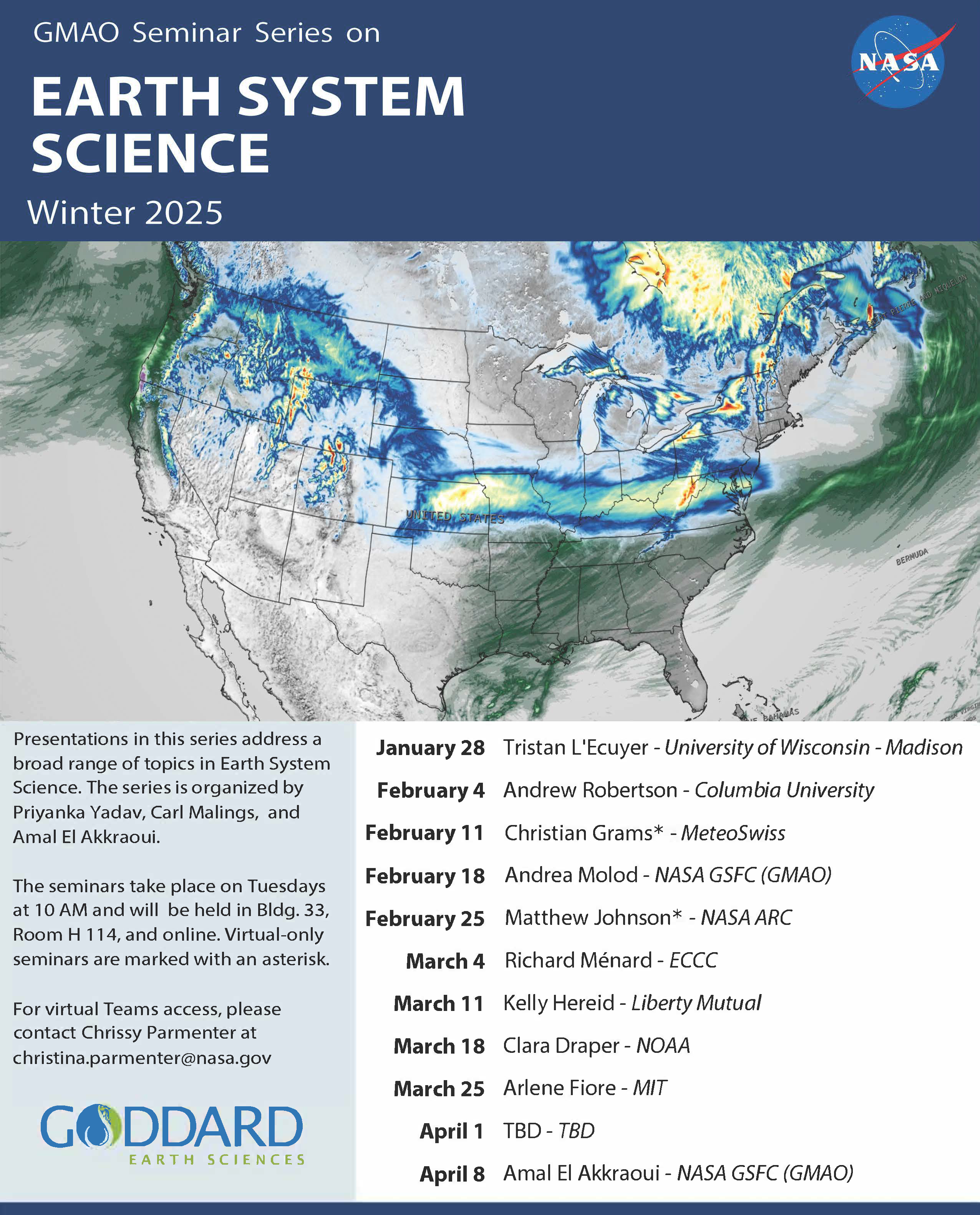SEMINARS & WORKSHOPS
GMAO Seminar Series on Earth System Science
Upcoming:
⋄ GMAO Seminar Series on Earth System Science ⋄
Speaker: Clara Draper, NOAA
Location: on-line
Time: 10am
As a part of a major upgrade to our global NWP system, NOAA is developing a new land data assimilation system. This seminar will present these developments, focusing on an upgrade to our snow depth analysis, and the introduction of our first global soil moisture and soil temperature analysis. The new snow depth analysis will be a variational data assimilation of station snow depth and satellite snow cover, using the JEDI software platform. Compared to our current snow depth analysis, the variational snow analysis improves both the initial snow states, and low-level atmospheric temperatures over land. The new soil analysis will expand the current GSI Hybrid 4DEnVar assimilation of atmospheric observations to also assimilate screen-level temperature and humidity observations, and to also update the soil moisture and soil temperature states. This system improves the 6-hour low-level atmospheric forecasts, as measured by the data assimilation observation minus forecast statistics for the screen-level variables, while having a minimal, but positive, impact higher in the atmosphere. The above developments are a part of a long-term effort to unify our land and atmospheric data assimilation to use the same methods, allowing more information to be shared between the land and atmosphere updates, and introducing the possibility of strongly coupled land/atmosphere data assimilation. The potential advantages and challenges of strongly coupled land and atmospheric data assimilation will then also be discussed.
Archived Posters for GMAO Seminar Series (Click for PDF version):
GMAO RESEARCH THEME MEETINGS:
The GMAO Research Theme Meetings are open only to GMAO members. These internal meetings, provide an opportunity for GMAO researchers to present new research results to their colleagues and to discuss their work and its implications for GEOS systems. Each year, two seasons of meetings are held on roughly two Thursdays each month.
♦ See the latest GMAO Research Theme Meeting schedule.
UPCOMING WORKSHOPS:
14-15 Sep., 2022: 2022 PACE Applications Workshop
08-12 Jan., 2023: Aerosol-Radiation Interactions at the 2023 AMS Annual Meeting
PAST WORKSHOPS:
06-10 June, 2022: 8th International Symposium on Data Assimilation (ISDA2022)
22-24 March, 2022: 2022 Applied Earth Observations Innovation Partnership (AEOIP) Workshop
23-27 January, 2022: 21st Conference on the Middle Atmosphere at the 102nd American Meteorological Society (AMS) Annual Meeting in Houston, TX.
14-17 June, 2021: The 17th International Workshop on Greenhouse Gas Measurements from Space
07-09 June, 2021: The International EnKF Workshop 2021
30 July 2020 - 25 February 2021: 2nd Workshop on Leveraging AI in Environmental Sciences, NOAA
12 January 2020: Short Course: An Introduction to Ensemble Data Assimilation and the Data Assimilation Research Testbed, AMS 100
26-28 September 2017: CERES Science Team meeting
1-5 June 2015: Workshop on Sensitivity Analysis and Data Assimilation in Meteorology and Oceanography
7-11 May, 2012: 4th World Climate Research Programme International Conference on Reanalyses (ICR4)
22-25 May, 2012: The Fifth WMO Workshop on the Impact of Various Observing Systems on NWP
24-28 October, 2011: WCRP Open Science Conference: Climate Research in Service to Society
10-14 October 2011: Ninth International Workshop on Adjoint Model Applications in Dynamic Meteorology
18-22 May 2009: Eighth International Workshop on Adjoint Model Applications in Dynamic Meteorology
- Responsible NASA Official :
Steven Pawson - Web Curator:
Bennett Erdman
- Privacy Policy & Important Notices
- NASA's Accessibility Statement
- Contact Us
- Page Last Updated: 01/21/2025























